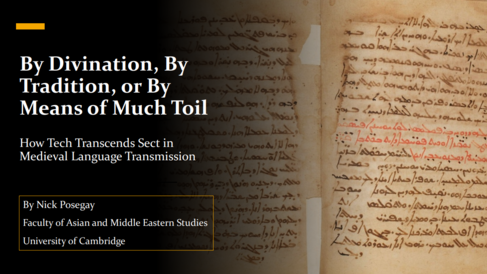
On March 27, 2023, we hosted the concluding workshop in our three-part Language Learning in/as Religious Education miniseries. Co-organiser Dr Anastasia Badder reports:
This workshop was the largest event yet, featuring ten speakers from universities and educational institutions across the UK, Europe, and the US:
- Jo-Ann Myers (Leo Baeck College)
The series as a whole was premised on the idea that sites of religious language learning are also sites of social reproduction and socialization. Linguistic interactions in religious settings play key roles in orienting students towards not only particular language practices, but also knowledges, moralities, relationships, and ways of being. They are central elements in the formation of religious communities and lives.
The first event (a webinar in November 2022) centered on a discussion about learning religion in and through language in which speakers and attendees explored the significance of Hebrew language learning in Jewish school settings, thinking about the nature of progress in Progressive religious contexts, and the significance of language and literacy as components of community identity.
The second event (an online roundtable held in February 2023) broadened the scope of the discussion. We discussed how different religious communities draw on language as a resource aimed at specific goals, and how different methodologies can reveal aspects of the aims, processes, and outcomes of religious language learning and use. Participants considered what distinguishes a religious language from a ‘mundane’ one, how to define religious language, some of the ethical challenges of researching religious language and language learning.
The final workshop was the most expansive. We asked what we know about how and why people teach and learning religious languages, and what we do with that knowledge.
As across the entire series, we sought to bring together different perspectives on religious language learning. We were particularly interested in the ways different lenses might mutually inform and inspire each other and, ultimately, lead to both more nuanced research and better educational experiences for learners. This was more than achieved in the workshop, which included anthropologists, education action researchers, educators, and historians.
Across the diversity of contributions, several key themes emerged. One revolved around questions about the extent to which religious languages change over time and how that change affects and is led by educational practices and motivations. Another theme concerned whether and how academics read theological views on religious languages, literacies, and pedagogies as data. Relatedly, we considered how educators of religious languages could draw on academic approaches and concepts to improve student learning experiences.
A third theme concerned the politics often surrounding and/or the politicization of religious languages and pedagogies. How do we to account for and make sense of those political issues, or teach within (or in resistance) to them? Finally, a key theme across the various talks and discussion revolved around debates about authenticity, accuracy, intention, and related language ideologies, and how to grapple these in order to better support student engagement.
Although we agreed in advance that this would be the last event of the miniseries, there is interest in continuing these conversations. Possible next steps include preparing a special issue on conversations between religious language researchers and teachers. We are also thinking about other ways to build and strengthen this burgeoning (and enthusiastic) network of educators and researchers.
